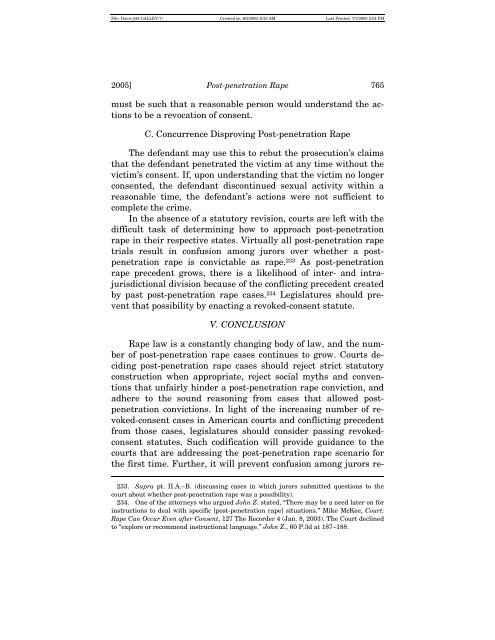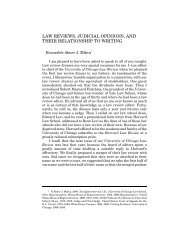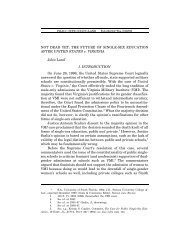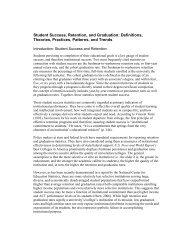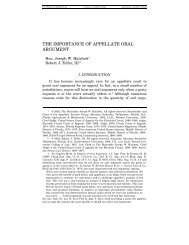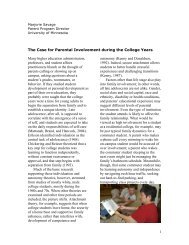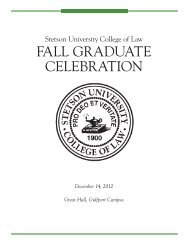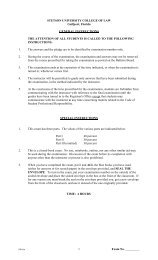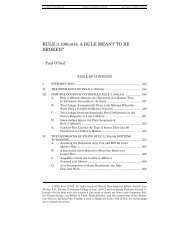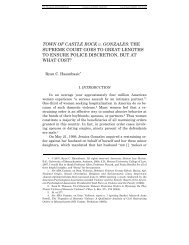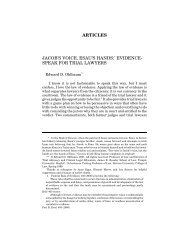the evolution of post-penetration rape law - Stetson University ...
the evolution of post-penetration rape law - Stetson University ...
the evolution of post-penetration rape law - Stetson University ...
Create successful ePaper yourself
Turn your PDF publications into a flip-book with our unique Google optimized e-Paper software.
File: Davis.343.GALLEY(7) Created on: 6/2/2005 9:33 AM Last Printed: 7/7/2005 2:54 PM2005] Post-<strong>penetration</strong> Rape 765must be such that a reasonable person would understand <strong>the</strong> actionsto be a revocation <strong>of</strong> consent.C. Concurrence Disproving Post-<strong>penetration</strong> RapeThe defendant may use this to rebut <strong>the</strong> prosecution’s claimsthat <strong>the</strong> defendant penetrated <strong>the</strong> victim at any time without <strong>the</strong>victim’s consent. If, upon understanding that <strong>the</strong> victim no longerconsented, <strong>the</strong> defendant discontinued sexual activity within areasonable time, <strong>the</strong> defendant’s actions were not sufficient tocomplete <strong>the</strong> crime.In <strong>the</strong> absence <strong>of</strong> a statutory revision, courts are left with <strong>the</strong>difficult task <strong>of</strong> determining how to approach <strong>post</strong>-<strong>penetration</strong><strong>rape</strong> in <strong>the</strong>ir respective states. Virtually all <strong>post</strong>-<strong>penetration</strong> <strong>rape</strong>trials result in confusion among jurors over whe<strong>the</strong>r a <strong>post</strong><strong>penetration</strong><strong>rape</strong> is convictable as <strong>rape</strong>. 233 As <strong>post</strong>-<strong>penetration</strong><strong>rape</strong> precedent grows, <strong>the</strong>re is a likelihood <strong>of</strong> inter- and intrajurisdictionaldivision because <strong>of</strong> <strong>the</strong> conflicting precedent createdby past <strong>post</strong>-<strong>penetration</strong> <strong>rape</strong> cases. 234 Legislatures should preventthat possibility by enacting a revoked-consent statute.V. CONCLUSIONRape <strong>law</strong> is a constantly changing body <strong>of</strong> <strong>law</strong>, and <strong>the</strong> number<strong>of</strong> <strong>post</strong>-<strong>penetration</strong> <strong>rape</strong> cases continues to grow. Courts deciding<strong>post</strong>-<strong>penetration</strong> <strong>rape</strong> cases should reject strict statutoryconstruction when appropriate, reject social myths and conventionsthat unfairly hinder a <strong>post</strong>-<strong>penetration</strong> <strong>rape</strong> conviction, andadhere to <strong>the</strong> sound reasoning from cases that allowed <strong>post</strong><strong>penetration</strong>convictions. In light <strong>of</strong> <strong>the</strong> increasing number <strong>of</strong> revoked-consentcases in American courts and conflicting precedentfrom those cases, legislatures should consider passing revokedconsentstatutes. Such codification will provide guidance to <strong>the</strong>courts that are addressing <strong>the</strong> <strong>post</strong>-<strong>penetration</strong> <strong>rape</strong> scenario for<strong>the</strong> first time. Fur<strong>the</strong>r, it will prevent confusion among jurors re-233. Supra pt. II.A.–B. (discussing cases in which jurors submitted questions to <strong>the</strong>court about whe<strong>the</strong>r <strong>post</strong>-<strong>penetration</strong> <strong>rape</strong> was a possibility).234. One <strong>of</strong> <strong>the</strong> attorneys who argued John Z. stated, “There may be a need later on forinstructions to deal with specific [<strong>post</strong>-<strong>penetration</strong> <strong>rape</strong>] situations.” Mike McKee, Court:Rape Can Occur Even after Consent, 127 The Recorder 4 (Jan. 8, 2003). The Court declinedto “explore or recommend instructional language.” John Z., 60 P.3d at 187–188.


